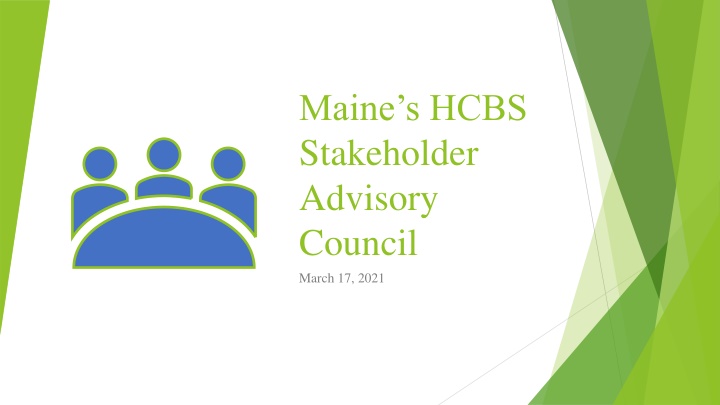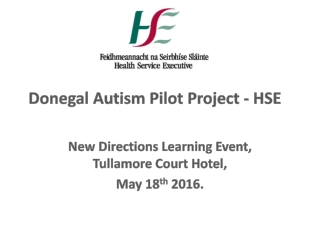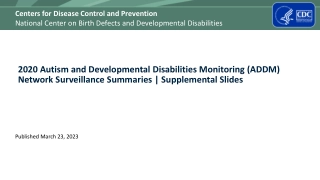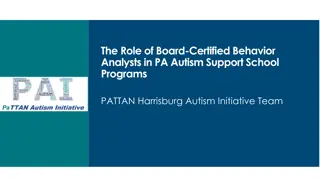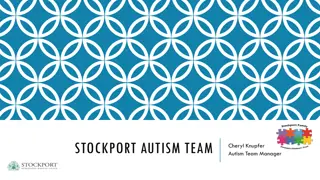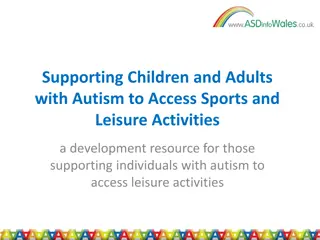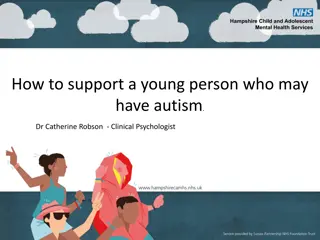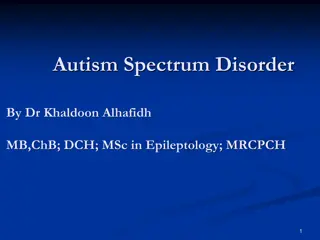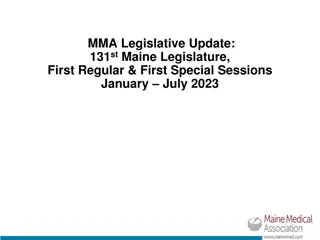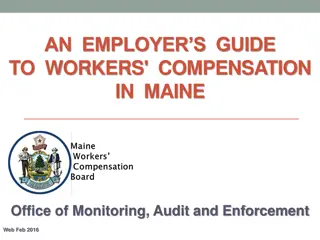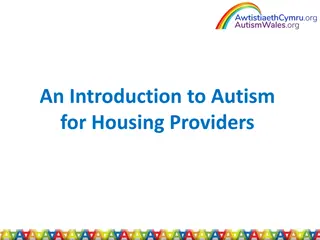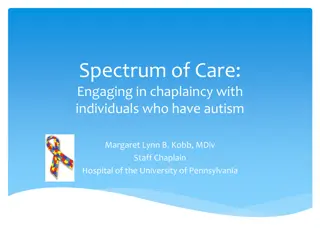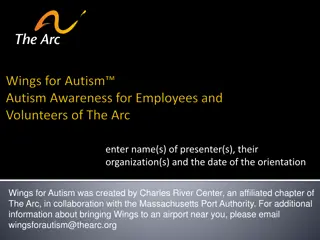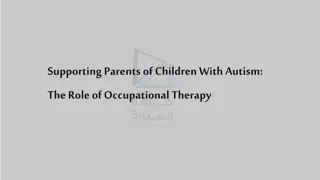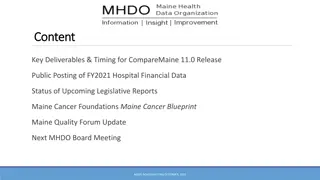Maine's Behavioral Regulations for Intellectual Disabilities and Autism Support
Maine's behavioral regulations ensure adults with intellectual disabilities or autism spectrum disorder receive services based on positive support strategies. The rules aim to end coercion, minimize unplanned interventions, and protect individual rights and well-being, in accordance with state law. The regulations outline a hierarchy of supports, interventions, and restrictions, including positive support plans, behavior management plans, emergency interventions, and safety device plans.
Download Presentation

Please find below an Image/Link to download the presentation.
The content on the website is provided AS IS for your information and personal use only. It may not be sold, licensed, or shared on other websites without obtaining consent from the author.If you encounter any issues during the download, it is possible that the publisher has removed the file from their server.
You are allowed to download the files provided on this website for personal or commercial use, subject to the condition that they are used lawfully. All files are the property of their respective owners.
The content on the website is provided AS IS for your information and personal use only. It may not be sold, licensed, or shared on other websites without obtaining consent from the author.
E N D
Presentation Transcript
Maines HCBS Stakeholder Advisory Council March 17, 2021
Welcome: Linda Lee, SAC co-chair HCBS Updates: Heidi Bechard, Lisa Sturtevant, Derek Fales, OADS Maine s Rules for Sections 21 and 29 Waiver participants whose behavior challenges people supporting them: Hilary Gove & Joseph Zamboni, OADS Meeting Agenda HCBS Settings Rule Standards: How these relate to the rights that Sections 21 and 29 Waiver participants have under Maine s current state law: Heidi Bechard, OADS Discussion and Feedback: All Q&A Next Meeting: June 23, 2021, 2-3:30 p.m. via Zoom
Maines Rules for Section 21 and 29 Waiver Participants Whose Behavior Challenges People Supporting Them 14-197 C.M.R. Ch. 5, Regulations Governing Behavioral Support, Modification and Management for People with Intellectual Disabilities or Autism in Maine
Maines behavioral regulations outline the rights of adults with intellectual disabilities or autism spectrum disorder who receive services through the Department. These regulations are designed to implement Maine law, 34-B M.R.S. 5605, Rights and Basic Protections of a Person with an Intellectual Disability or Autism. Maine s Behavioral Regulations (Chapter 5) The purpose of this rule is to ensure that services provided to adults experiencing challenging behaviors are based on positive support strategies, and adhere to the commitment to end coercion and minimize unplanned, informal and inconsistent interventions. When interventions are used, the goal is to protect the individual s rights and well-being.
This rule identifies a hierarchy of supports, interventions and restrictions for supporting individuals with challenging behaviors. Positive Support Plan A component of an individual s personal plan that supports individual growth and enhances quality of life First approach to reduce challenging behavior and eliminate need for restrictive practices Behavior Management Plan Key Components of Chapter 5 Written plan that describes all planned interventions, including restriction of rights and use of restraint Regional review teams are responsible for reviewing plans. Emergency Intervention Used when an individual s challenging behavior presents an imminent risk to the health and/or safety of the individual or community When an emergency intervention is utilized, the least restrictive technique necessary to make the situation safe must be used. Safety Device Plan A device implemented to maintain the safety of the individual
In light of the Global HCBS Settings Rule, OADS is in the process of revising Chapter 5 to ensure that this rule is consistent with HCBS guidelines Common themes in both rules: Dignity, privacy, individual choice Why is OADS Revising Chapter 5? In addition to today s discussion, OADS is hosting listening sessions to gather feedback on Chapter 5. The goal of the listening sessions is to receive and better understand stakeholder feedback prior to us modifying the rule. These sessions will not replace the formal comment period required by the Administrative Procedure Act. Listening Session Dates: March 26 & April 30
Contact Hilary Gove at hilary.gove@maine.gov Questions?
The HCBS Settings Rule Goals: Maximize opportunities for participants to have full access to the benefits of community living Access Ensure participants can receive services in the most integrated setting Integration Quality Ensure the quality of Home and Community-Based Services Rights Provide rights protections for participants For More Information www.Maine.gov/dhhs/oads/HCBS www.Maine.gov/dhhs/oads/HCBS 8
HCBS Rights & Rights in State Law Maine law gives individuals the right to be free from restraint unless the restraint is: Right to freedom from restraint, including restrictive measures o Part of an approved behavior management plan; or o To protect an individual or others from immediate injury. Maine law allows for the use of approved safety devices for the purpose of keeping an individual safe. o Some examples include: seat belts, gloves, foot straps, chest straps, bed rails, helmets, etc.
HCBS Rights & Rights in State Law (2) Maine law gives individuals the right to interact with the community and participate in social activities, including physical activity. Right to have an individualized schedule and activities, selected by the person and supported by the provider
HCBS Rights & Rights in State Law (3) Maine law gives individuals the right to have access to healthy food Denying food to individuals cannot be used as a punishment for behavior Right to have access to food at any time
HCBS Rights & Rights in State Law (4) Maine law allows individuals to have visitors during reasonable hours unless the right of communication has been restricted as part of an approved behavior management plan. Denying communication or visitation at any time with family members or significant others as a punishment for behavior is not allowed Right to choose his/her own visitors and time when visits occur
HCBS Rights & Rights in State Law (5) Right to choose housemates and roommate if sharing a living unit and/or a bedroom Maine law does not include language regarding choice of housemates or roommates
HCBS Rights & Rights in State Law (7) Right to lockable entrance doors to the person s living unit (and bedroom if the person shares a living unity with unrelated individuals), and only the individual and appropriate staff have keys to the doors Maine law gives individuals the right to privacy, including the right to have private conversations.
HCBS Rights & Rights in State Law (6) Maine law allows individuals to have personal items unless: o The personal item is causing a risk to health and safety; or o Temporary removal of the personal item is necessary to protect the person or others from immediate injury. Right to furnish and decorate their living unit and bedrooms they choose
ALL SETTINGS: Freedom from restraint (Mods allowed for Section 21/29 only), including restrictive measures (Mods allowed for Section 18/21/29 only) A Modification Must Be for a Health and/or Safety Reason - Not for Provider or Staff Convenience or Resource Constraints POOC: Freedom and support to control their schedules and activities. POOC: Freedom and support to ensure access to food at any time. POOC: Have visitors at any time, taking into account respect for others sharing the unit. RES POOC: A choice in determining with whom to share the living unit (and bedroom, if applicable) RES POOC: Lockable entrance door(s) to living unit (and bedroom doors if sharing with other unrelated persons) With only the individual and appropriate staff shall have keys/codes for door(s). POOC = Provider Owned or Controlled RES POOC = Residential Provider Owned or Controlled RES POOC: Ability to furnish and decorate their living unit and/or bedroom as desired, consistent with the terms of the lease or residency agreement. 16
How should the HCBS Settings Rule RIGHTS PROTECTIONS change Maine s law and rules for Waiver participants? Are changes needed? If yes, what kind of changes and why?
Do you think the HCBS Settings Rule RIGHTS PROTECTIONS are in direct conflict with any of Maine s existing law and rules for Waiver participants? If yes, can you give an example? If no, why not?
Consider What You Know About Maines Rules for Sections 21 and 29 Waiver Participants Whose Behavior Challenges People Supporting Them Sometimes called Behavior Regs or 14-197 Chapter 5 Involves use of Positive Support Plans, Behavior Management Plans, In-Home Stabilization Plans, Safety Devices What are your current concerns? Given the HCBS Settings Rule Rights Protections, what do you expect would be changed in these rules?
Modifications to HCBS Settings Rule RIGHTS PROTECTIONS are permitted for a specific individual if there is a legitimate health or safety reason. Do you have concerns about how Modifications to HCBS Settings Rule RIGHTS PROTECTIONS will be used in practice? If yes, what are your concerns?
Any other comments or suggestions you want to make about the importance of ensuring RIGHTS PROTECTIONS for Waiver participant? And how best to do this?
Questions Comments Other Business
Next Quarterly HCBS SAC Meeting June 23, 2021 at 2 p.m.
